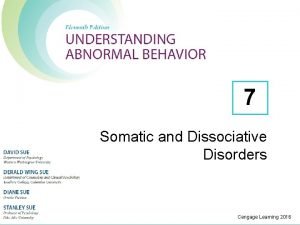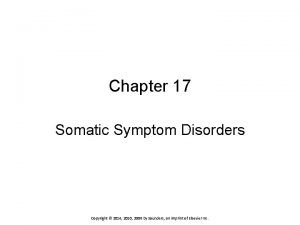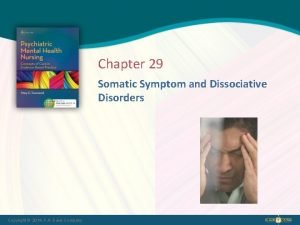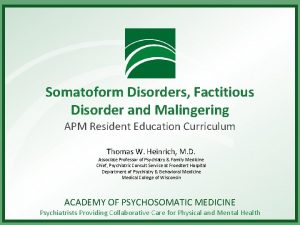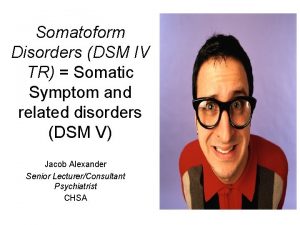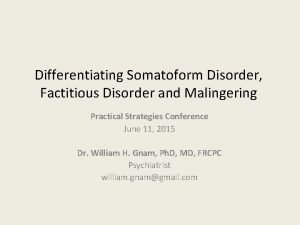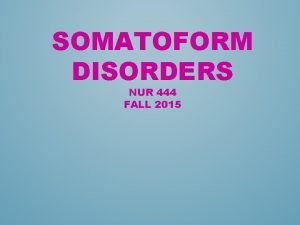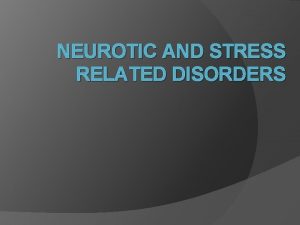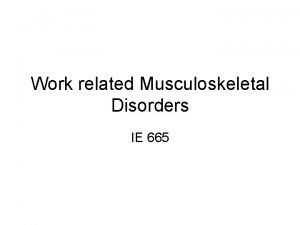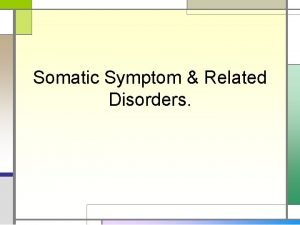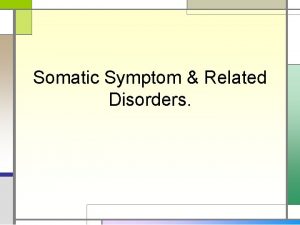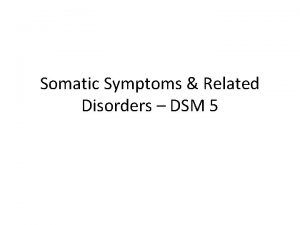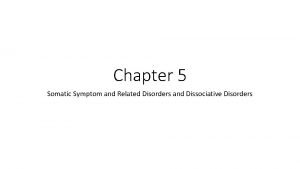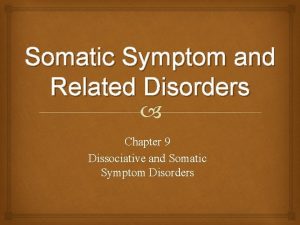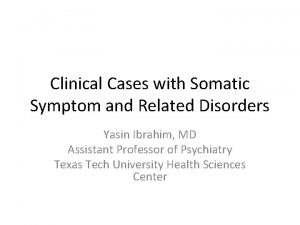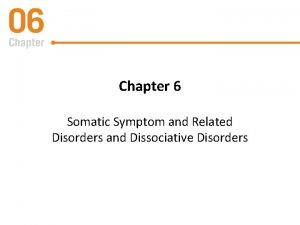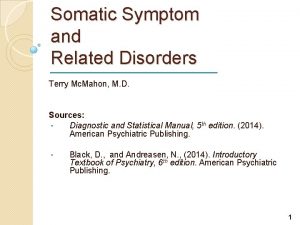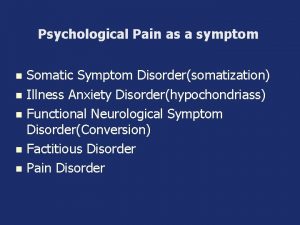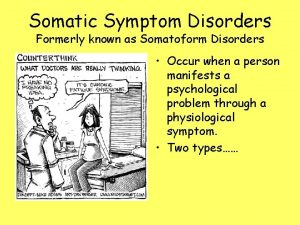Somatic Symptom Related Disorders Interdisciplinary Treatment Providing longterm














- Slides: 14

Somatic Symptom & Related Disorders.

Interdisciplinary Treatment • Providing long-term general management of the chronic condition • Conservatively treating comorbid psychiatric and physical problems • Providing care in special settings, including group treatment

Nursing Management: Biologic Domain • Assessment: – – Review of systems Assessment of pain Physical functioning Pharmacologic • Usually taking a large number of meds • Self-medicate and provider shop – Health attitude survey – Review clinical vignette • Nursing Diagnoses – Fatigue, pain, disturbed sleep

Biologic Nursing Interventions • Spend time with physical complaints • Help patient establish a daily routine • Continually monitor medication • Pain management – need multiple approaches • Activity enhancement • Nutrition regulation • Relaxation

Pharmacologic Interventions • There is no medication for somatization disorder. • Treat the comorbid disorders. – Depression: antidepressants - MOAI – Anxiety: Avoid benzodiazepines. • Monitor closely. • Observe for drug-drug interactions.

Nursing Management: Psychological Domain Assessment Nursing Diagnoses • Mental status usually normal • Anxiety • Appearance may be flamboyant, exaggerated • Ineffective sexuality patterns • Preoccupied with personal illness (may keep a copy of record), series of personal crisis. • Emotional reactions to life stressors • Labile mood • Impaired social interactions • Ineffective coping • Ineffective management of therapeutic regimen

Psychological Nursing Interventions • Maintaining nurse-patient relationship • Counseling • Problem solving • Health teaching

Nursing Management: Social Domain Assessment • How much time seeking medical care and treating illnesses? • Extent of disability? • Employment status? • Social network? Do they see their friends as providers? • Family members – Tired of all the complaints? – Alcoholism is common. Nursing Diagnosis • Caregiver role strain, risk • Ineffective community coping • Disable family coping • Social isolation

Nursing Diagnosis • • Fatigue Pain Sleep pattern disturbance Altered sexuality patterns, anxiety Ineffective coping Impaired social interactions Ineffective management of therapeutic regimen

Social Nursing Interventions • Problem-solving groups • Assertiveness groups • Family interventions

Continuum of Care • Inpatient care – very rare • Emergency care – mostly for physical problems, except when depressed • Community treatment – Spend lifetime in health care system – Most care delivered as outpatient

Factitious Disorders • Factitious disorder (Munchausen’s syndrome) – Different than malingering (has other motivations) – Injure themselves covertly – Produce physical symptoms • Factitious disorder NOS (by proxy) – Injure others in order to gain attention (mother hurting child)

Nursing Management Assessment • Chronology of medical/psychological illnesses • Early childhood experiences (abuse, neglect, role of selfinjury) • Family assessment • • • Nursing Diagnosis Risk for trauma Risk for selfmutilation Ineffective individual coping Low self-esteem

Nursing Intervention • Goal: To replace dysfunctional, attentionseeking behaviors with positive behaviors • Accept and value patient. • Encourage long-term psychotherapy. • Confrontation is effective if patient feels supported.
 Dissociative
Dissociative Chapter 17 somatic symptom disorders
Chapter 17 somatic symptom disorders Types of somatic disorder
Types of somatic disorder Vindicate mnemonic
Vindicate mnemonic Somatic symptoms
Somatic symptoms Somatic symptom disorder vs factitious disorder
Somatic symptom disorder vs factitious disorder Nursing diagnosis of somatoform disorder
Nursing diagnosis of somatoform disorder Lts kernel
Lts kernel Thomas silverstein
Thomas silverstein Providing improper or unprofessional treatment or care
Providing improper or unprofessional treatment or care Providing improper or unprofessional treatment or care
Providing improper or unprofessional treatment or care Bipolar and other related disorders
Bipolar and other related disorders What is neurosis disorder
What is neurosis disorder Work related musculoskeletal disorders definition
Work related musculoskeletal disorders definition Neurosis
Neurosis
